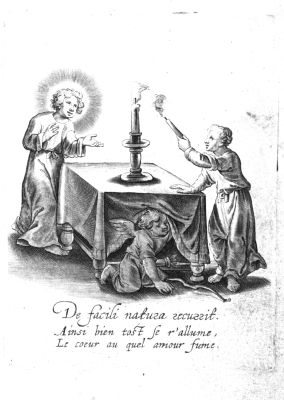Renovatio Amoris [33]

XXXIII.
Ouid.
Quisquis es, antiqui remoue monumenta caloris,
A regno Dominæ qui modo liber abis.
Vera nec ora vide, moueat nec imago saliuam,
Nec digitis gemmas, quas tulit illa, gere.
Fax exstincta recens trahit, ah! trahit eminus ignem,
Et redit in flammam quod vapor antè fuit.
Sic nisi vitaris quidquid reuocabit Amorem,
Flamma recandescit quæ modò nulla fuit.
Ouid.
Quisquis es, antiqui remoue monumenta caloris,
A regno Dominæ qui modo liber abis.
Vera nec ora vide, moueat nec imago saliuam,
Nec digitis gemmas, quas tulit illa, gere.
Fax exstincta recens trahit, ah! trahit eminus ignem,
Et redit in flammam quod vapor antè fuit.
Sic nisi vitaris quidquid reuocabit Amorem,
Flamma recandescit quæ modò nulla fuit.

Renouuellement de l'Amour.
XXXIII.
Si lors que nos Amours esteignent leurs chandelles,
Celle aussy du diuin s'esteignoit auecq elles,
Qui pourroit esperer de r'allumer ces feux?
Mais puis que ce flambeau ne perdi iamais ses flames,
Lors que le nostre meurt, approchons en nos ames,
Nous les veoirons bien tost viure & brusler tous deux.
XXXIII.
Si lors que nos Amours esteignent leurs chandelles,
Celle aussy du diuin s'esteignoit auecq elles,
Qui pourroit esperer de r'allumer ces feux?
Mais puis que ce flambeau ne perdi iamais ses flames,
Lors que le nostre meurt, approchons en nos ames,
Nous les veoirons bien tost viure & brusler tous deux.
Translations
 |
Renewal of love. |
 |
Although love goes away, overcome by time and reason, still it does not leave the soul totally, and there remains the trace
of as it were a burnt out or smoking forest. |
 |
Nature will return to the ways once condemned1. |
 |
 |
The matter easily returns to what it really is4. |
Literature
Sources and parallels
-
Same copperplate, slightly altered, in: 't Gezigt van 't beminde verwekt liefde [49] (in: Willem den Elger, Zinne-beelden der liefde (1703))
[Compare
![Compare [compare]](/static/images/compare2.gif) ]
]
-
Candles, in:Flamma fumo proxima. [16] (in: Jacob Cats, Proteus (1618))
[Compare
![Compare [compare]](/static/images/compare2.gif) ]
]
References, across this site, to this page:
- Flamma fumo proxima. [16] (in: Jacob Cats, Proteus (1618))
- 't Gezigt van 't beminde verwekt liefde [49] (in: Willem den Elger, Zinne-beelden der liefde (1703))
Iconclass
While a cupid hides under the table, a young woman uses a candle to rekindle another one; a young man watching- arm stretched forward - AA - both arms or hands
[31AA2512]

- youth, adolescent
[31D12]

- adolescent, young woman, maiden
[31D13]

- awakening love (+ variant)
[33C218(+0)]

- couple of lovers
[33C23]

- candle (+ kindling a light; lit, burning light, lamp, candle)
[41B31(+1)]

- archer's weapons: bow
[45C15(BOW)]

- quiver
[45C23]

- proverbs, sayings, etc. (with TEXT)
[86(RENOVATIO AMORIS)]

- (story of) Cupid, Amor (Eros)
[92D1]

- attributes of Cupid (with NAME)
[92D18(BOW)]

- attributes of Cupid (with NAME)
[92D18(QUIVER)]

Comments
commentaryNotes
Et [not in text Juvenal] ad mores natura recurret ['recurrit' in text Juv.]/Damnatos. Iuvenalis 13, 239-240 ("Nature will
return to the ways once comdemned").
'Sed fugitare decet ...', Lucret. IV, 1040 or thereabouts. The text of Lucretius has been heavily emended (e.g. extensive
verse transpositions) by modern editors.
'Abstergere': "wipe off". Note that ed. Bailey has 'abterrere' here "frighten off". "But it is fitting to flee the visions
and wipe off the fodder of love, and turn the the mind elsewhere". 'Pabula' translated here as "fodder" as Lucretius is trying
to wean his readers off the passion of love. However, 'pabula' can be neutral: 'food', 'nourishment'. The 'simulacra' ('visions')
refer to the typically Epicurean/Lucretian concept of eidola/simulacra, pictures made up of very fine atoms (like what dreams
are made of), to account for the phenomenon that we 'see' things that have no clearly observable counterparts in reality.
'De facili natura recurrit': for this, and in fact the whole subscription cf. Hor. Epist. I, 10, 24 "Naturam expellas [expelles
in modern editions] furca, tamen usque recurret" ("You may drive out Nature with a pitchfork, yet she will ever hurry back",
transl. Rushton Fairclough, Loeb ed.).
![[H O M E : Emblem Project Utrecht]](/static/images/rd-small.gif)




































































































